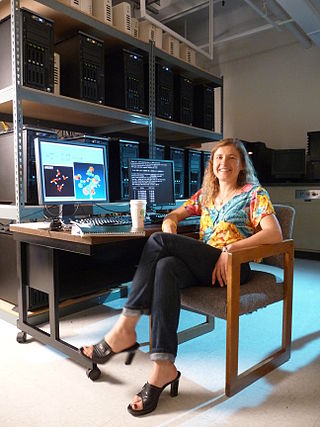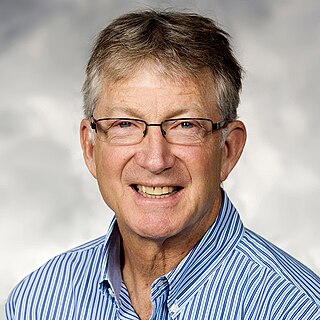Related Research Articles

Sir John Anthony Pople was a British theoretical chemist who was awarded the Nobel Prize in Chemistry with Walter Kohn in 1998 for his development of computational methods in quantum chemistry.
Marshall Fixman was an American physical chemist, University Distinguished Professor Emeritus at Colorado State University, and a member of the U.S. National Academy of Sciences.

Henry Frederick "Fritz" Schaefer III is an American computational, physical, and theoretical chemist. He is one of the most highly cited chemists in the world, with a Thomson Reuters h-index of 121 as of 2020.

Anna Igorevna Krylov is the USC Associates Chair in Natural Sciences and Professor of Chemistry at the University of Southern California (USC). Working in the field of theoretical and computational quantum chemistry, she is the inventor of the spin-flip method. Krylov is the president of Q-Chem, Inc. and an elected member of the International Academy of Quantum Molecular Science, the Academia Europaea, and the American Academy of Sciences and Letters.

Michael Lawrence KleinNAS is Laura H. Carnell Professor of Science and director of the Institute for Computational Molecular Science in the college of science and technology at Temple University in Philadelphia, US. He was previously the Hepburn Professor of Physical Science in the Center for Molecular Modeling at the University of Pennsylvania.
Angela K. Wilson is an American scientist and former (2022) President of the American Chemical Society. She currently serves as the John A. Hannah Distinguished Professor of Chemistry, associate dean for strategic initiatives in the College of Natural Sciences, and director of the MSU Center for Quantum Computing, Science, and Engineering (MSU-Q) at Michigan State University.
V. Alan Kostelecký is a theoretical physicist who is a distinguished professor of physics at Indiana University, Bloomington. He is noted for his work on Lorentz symmetry breaking in particle physics. He has been described as the world's leading authority on violations of space-time symmetry.
Robert Eugene Wyatt is an emeritus Professor of Chemistry at the University of Texas at Austin, Department of Chemistry and Biochemistry.

Martin Gruebele is a German-born American physical chemist and biophysicist who is currently emeritus James R. Eiszner Chair in Chemistry, Professor of Physics, Professor of Biophysics and Computational Biology at the University of Illinois Urbana-Champaign.

Donald Gene Truhlar is an American scientist working in theoretical and computational chemistry and chemical physics with special emphases on quantum mechanics and chemical dynamics.

Jack H. Freed is an American chemist known for his pioneering work in electron paramagnetic resonance spectroscopy. He is the Frank and Robert Laughlin Professor of Physical Chemistry, emeritus, at Cornell University in Ithaca, New York.
Sadhan Basu FNA, FASc, FRSC was an Indian physical chemist, academic and the Palit Professor of Chemistry at the University of Calcutta from 1964 to 1985. He was known for his elucidation of the Quantum Mechanical Model of Robert S. Mulliken. His article, Degree of Polymerization and Chain Transfer in Methyl Methacrylate, co-authored with Jyotirindra Nath Sen and Santi R. Palit was the first published Indian article on polymer chemistry. He was an elected fellow of the Royal Society of Chemistry, Chemical Society of France, Indian Chemical Society, Indian National Science Academy and the Indian Academy of Sciences. The Council of Scientific and Industrial Research, the apex agency of the Government of India for scientific research, awarded him the Shanti Swarup Bhatnagar Prize for Science and Technology, one of the highest Indian science awards, in 1962, for his contributions to chemical sciences.
Jayaraman Chandrasekhar is an Indian computational chemist and a former professor at the department of organic chemistry of the Indian Institute of Science. He is known for his studies on the structure and bonding of organic molecules and is an elected fellow of Indian National Science Academy, and the Indian Academy of Sciences The Council of Scientific and Industrial Research, the apex agency of the Government of India for scientific research, awarded him the Shanti Swarup Bhatnagar Prize for Science and Technology, one of the highest Indian science awards, in 1995, for his contributions to chemical sciences.

Albert Stolow is a Canadian physicist. He is the Canada Research Chair in Molecular Photonics, full professor of chemistry & biomolecular sciences and of physics, and a member of the Ottawa Institute for Systems Biology at the University of Ottawa. He is the founder and an ongoing member of the Molecular Photonics Group at the National Research Council of Canada. He is adjunct professor of Chemistry and of Physics at Queen's University in Kingston, and a Graduate Faculty Scholar in the department of physics, University of Central Florida and a Fellow of the Max-Planck-uOttawa Centre for Extreme and Quantum Photonics. In 2008, he was elected a Fellow in the American Physical Society, nominated by its Division of Chemical Physics in 2008, for contributions to ultrafast laser science as applied to molecular physics, including time-resolved studies of non-adiabatic dynamics in excited molecules, non-perturbative quantum control of molecular dynamics, and dynamics of polyatomic molecules in strong laser fields. In 2008, Stolow won the Keith Laidler Award of the Canadian Society for Chemistry, for a distinguished contribution to the field of physical chemistry, recognizing early career achievement. In 2009, he was elected a Fellow of the Optical Society of America for the application of ultrafast optical techniques to molecular dynamics and control, in particular, studies of molecules in strong laser fields and the development of new methods of optical quantum control. In 2013, he was awarded the Queen Elizabeth II Diamond Jubilee Medal (Canada). In 2017, Stolow was awarded the Earle K. Plyler Prize for Molecular Spectroscopy and Dynamics of the American Physical Society for the development of methods for probing and controlling ultrafast dynamics in polyatomic molecules, including time-resolved photoelectron spectroscopy and imaging, strong field molecular ionization, and dynamic Stark quantum control. In 2018, Stolow was awarded the John C. Polanyi Award of the Canadian Society for Chemistry “for excellence by a scientist carrying out research in Canada in physical, theoretical or computational chemistry or chemical physics”. In 2020, he became Chair of the Division of Chemical Physics of the American Physical Society. His group's research interests include ultrafast molecular dynamics and quantum control, time-resolved photoelectron spectroscopy and imaging, strong field & attosecond physics of polyatomic molecules, and coherent non-linear optical microscopy of live cells/tissues, materials and geological samples. In 2020, Stolow launched a major new high power ultrafast laser facility at the University of Ottawa producing high energy, phase-controlled few-cycle pulses of 2 micron wavelength at 10 kHz repetition rate. These are used for High Harmonic Generation to produce bright ultrafast Soft X-ray pulses for a new Ultrafast Xray Science Laboratory.
Annabella Selloni is the David B. Jones Professor of Chemistry at Princeton University.
Katherine Birgitta Whaley is a professor of chemistry at the University of California Berkeley and a senior faculty scientist in the Division of Chemical Sciences at Lawrence Berkeley National Laboratory. At UC Berkeley, Whaley is the director of the Berkeley Quantum Information and Computation Center, a member of the executive board for the Center for Quantum Coherent Science, and a member of the Kavli Energy Nanosciences Institute. At Lawrence Berkeley National Laboratory, Whaley is a member of the Quantum Algorithms Team for Chemical Sciences in the research area of resource-efficient algorithms.
Larry A. Curtiss is an American chemist and researcher. He was born in Madison. WI. in 1947. He is a distinguished fellow and group leader of the Molecular Materials Group in the Materials Science Division at the U.S. Department of Energy's (DOE) Argonne National Laboratory. In addition, Curtiss is a senior investigator in the Joint Center for Energy Storage Research (JCESR), a DOE Energy Storage Hub, and was the deputy director of the Center for Electrochemical Energy Science, a DOE Energy Frontier Research Center.

James L. Skinner is an American theoretical chemist. He is the Joseph O. and Elizabeth S. Hirschfelder Professor Emeritus at the University Wisconsin-Madison. Until 2024 he was a member of the Scientific Advisory Board of the Welch Foundation. Until 2020, Skinner was the Crown Family Professor of Molecular Engineering, professor of chemistry, director of the Water Research Initiative and deputy dean for faculty affairs of the Pritzker School of Molecular Engineering at the University of Chicago. Skinner is recognized for his contributions to the fields of theoretical chemistry, nonequilibrium statistical mechanics, linear and nonlinear spectroscopy of liquids, amorphous and crystalline solids, surfaces, proteins, and supercritical fluids. Skinner is the co-author of over 230 peer-reviewed research articles.
Karl Frederick Freed is an American theoretical chemist recognized for his research in polymer physics. Freed has spent his academic career in the department of chemistry and the James Frank Institute at the University of Chicago, where he is the Henry G. Gale Distinguished Service Professor emeritus. He is a member of the American Academy of Arts and Sciences, a Fellow of the American Physical Society, and was awarded the Polymer Physics Prize of the American Physical Society in 2014 and the Award in Pure Chemistry by the American Chemical Society in 1976.

Charles David Sherrill is a professor of chemistry and computational science and engineering at Georgia Tech working in the areas of theoretical chemistry, computational quantum chemistry, and scientific computing. His research focuses on the development and application of theoretical methods for non-covalent interactions between molecules. He is the lead principal investigator of the Psi open-source quantum chemistry program.
References
- ↑ "Krishnan Raghavachari". indiana.edu.
- ↑ "Faculty + Research: Department of Chemistry: Indiana University Bloomington". raghavachari.chem.indiana.edu. Retrieved 24 January 2017.
- 1 2 3 "Honoree: Search Awards: University Honors & Awards: Indiana University". honorsandawards.iu.edu. Archived from the original on 2 February 2017. Retrieved 24 January 2017.
- 1 2 "Krishnan Raghavachari". IAQMS. Retrieved 21 September 2020.
- ↑ "APS Fellow archive". APS. Retrieved 21 September 2020.